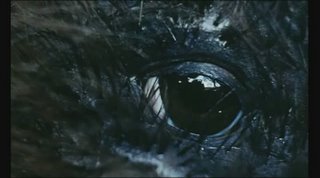
For those of you looking for pure B. Jones, you will have to forgive this bit of autobiography below. However, the revelation into Jones' personality provided by Steiner's essay was so profound for me that I thought it merited posting here.
To say that this last year has been difficult would be something of an understatement. In the retrospect that comes with the turning of the year, it seems the word difficult has been in my mouth more often than any other. And so it was with no fear of irony that I pulled George Steiner's On Difficulty and Other Essays from B. Jones' 'bookcase of the essentials' the other day. He had often referred me to the central essay, saying that it was a key to unlocking the dungeon of the twentieth century (or something like that).
Of course, as with so many essays, poems, books, songs, etc. that he constantly implored me to read, I had never read it. Turning now to the central essay and scanning the paragraphs, I came across this remarkable passage:
He will labour to undermine, through distortion, through hyperbolic augment, through elision and displacement, the banal and constricting determinations of ordinary, public syntax. The effects which he aims at can vary widely: they extend from the subtlest of momentary shocks, that unsettling of expectation which comes with a conceit in Metaphysical verse, to the bewildering obscurity of Mallarme and the modernists. The underlying manoeuvre is one of rallentando. We are not meant to understand easily and quickly. Immediate purchase is denied us. The text yields its force and singularity of being only gradually. In certain fascinating cases, our understanding, however strenuously won, is to remain provisional. There is to be an undecidability at the heart, at what Coleridge called the inner penetralium of the poem (there is a concrete sense in which the great allegories of ingress, of pilgrimage to the centre, such as the Roman de la rose and the Commedia, compel the reader to re-enact, in the stages of his reading, the adventure of gradual unfolding told by the poet).
And if that wasn't a perfect description of the life of B. Jones, then I didn't know what was. I even looked up the publication date (1978) to see if he hadn't come across it in his youth and decided to take it as a credo for living. Simply amazing. I truly regretted that I hadn't read it when he was alive so that I could've discussed it with him. As it was, I stopped everything that I was doing and sat down to read the entire essay.

Essentially, Steiner breaks difficulty into four types: contingent, modal, tactical and ontological. (Now, hang on for a second). His primary focus is with poetry: why certain poems are so difficult to understand. But as I indicated above, what was most fascinating to me was the application of the types to the more elusive difficulties of a life. It was one of those reading experiences where you begin to smile with understanding and then end up laughing out loud at how each new paragraph unfolds. It was like a clockwork play, a perfect sonnet, a shimmering fugue quartet. I have read a fair amount of George Steiner but this was a virtuoso perfomance. In fact, it would be the first thing I would refer people to if they were unfamiliar with Steiner's work. (That Jones pushed Real Presences into my hands before this bewilders me.) So I recommend it. Highly.
I wish I could just post the entire essay here but I don't feel right about that. But here are the four types with passages from Steiner. The concern is poetry but turn them outwards, maybe to something or one that isn't necessarily a poem but is poetic - difficultly so - and see how appropriately they might apply.
Contingent Difficulties - Mostly things that have to be 'looked up'. Words that you don't know. Obscure references. Lexical issues. Answered with a dictionary, concordance, encyclopedia, etc..
In practice, the homework of elucidation may be unending. No individual talent or life-span, no collective industry, can complete the task. But not in theory, not formally. This is my point. Theoretically, there is somewhere a lexicon, a concordance, a manual of stars, a florilegium, a pandect of medicine, which will resolve the difficulty. In the 'infinite library' (Borges's 'Library that is the Universe') the necessary reference can be found. Walter Benjamin suggests that there are cruces and talismanic deeps in poetry which cannot be elucidated now or at all times; they were understood formerly, they may be rightly glossed 'tomorrow'. No matter: in some time, at some place, the difficulty can be resolved.
Modal Difficulties - Takes more than looking up. A fundamental oddness, strangeness that you just don't get. Something like 'culture shock'. I am reminded of when I first read Joyce's Ulysses. I was young and just couldn't figure out what it was about. Of course, now it all seems so obvious that I wonder why I couldn't see it then.
[W]e may find ourselves saying 'this is a difficult poem' or 'I find it difficult to grasp, to place this poem' (the shift into a first-person register of experience is, here, significant) even where the lexicalgrammatical components are pellucid. We have looked up what there is to look up, we have confidently parsed the elements of phrase - and still there is opaqueness. In some way, the centre, the rationale of the poem's being, holds against us.
Tactical Difficulties - Obscurities. Deliberately occult. Codes. Hidden allegories. Puzzles.
The poet may choose to be obscure in order to achieve certain specific stylistic effects. He may find himself compelled towards obliquity and cloture by political circumstances: there is a very long history of Aesopian language, of 'encoding' and allegoric indirection in poetry written under pressure of totalitarian censorship (oppression, says Borges, is the mother of metaphor). The constraints may be of a purely personal nature. The lover will conceal the identity of the beloved or the true condition of his passion.This was all well and good. But Steiner opened up another aspect to me with the following passage:
It is the poet's aim to charge with supreme intensity and genuineness of feeling a body of language, to 'make new' his text in the most durable sense of illuminative, penetrative insight. But the language at his disposal is, by definition, general, common in use. Its similes are stock, its metaphors worn down to cliches. How can this soiled organon serve the most individual and innovative of needs? There have, throughout literary history, been logical terrorists who have taken the implicit paradox to its stark conclusion. The authentic poet cannot make do with the infinitely shop-worn inventory of speech, with the necessarily devalued or counterfeit currency of the every-day.
Just these phrases alone are enough to make me smile: "soiled organon", "logical terrorists", "shop-worn inventory of speech", "counterfeit currency of the every-day". Beautiful.
It was under this type of tactical difficulty that I came across the passage I initially quoted above.
Ontological Difficulties - Essential questions. The very existence, being, of the thing is in question here. Why was it created? Who is the audience? Why is there performance at all? I think of a spectrum from an autistic savant filling page after page with unreadable language to serial murderers 'decorating' their dungeons to Holy Men chanting mantras in isolated caves.
Because this type of difficulty implicates the functions of language and of the poem as a communicative performance, because it puts in question the existential suppositions that lie behind poetry as we have known it, I propose to call it ontological. Difficulties of this category cannot be looked up; they cannot be resolved by genuine readjustment or artifice of sensibility; they are not an intentional technique of retardation and creative uncertainty (though these may be their immediate effect). Ontological difficulties confront us with blank questions about the nature of human speech, about the status of significance, about the necessity and purpose of the construct which we have, with more or less rough and ready consensus, come to perceive as a poem.
This is certainly the most interesting type of difficulty. Perhaps the most vital to my outwardly formed interpretation. To exploring a life lived and died as a poem of sorts. I realize now that the difficulties that I have had in coming to terms with the death of B. Jones are mostly of the ontological type. His life was/is like a poem to me. And I guess the crux of the difficulty is in that tense change marked by /. Because I don't/didn't want the poem to ever end.
I will leave with two passages from Steiner as he says it so much better than me.
It is not so much the poet who speaks, but language itself: die Sprache spricht. The authentic, immensely rare, poem is one in which 'the Being of language' finds unimpeded lodging, in which the poet is not a persona, a subjectivity 'ruling over language', but an 'openness to', a supreme listener to, the genius of speech. The result of such openness is not so much a text, but an 'act', an eventuation of Being and literal 'coming into Being'. [...]
We bear witness to its precarious possibility of existence in an 'open' space of collisions, of momentary fusions between word and referent. The operative metaphor may be that crucial to Mallarme's famous L'absente de tous bouquets, to the modem physicist's determination of 'the unperceived event' in the cloud-chamber, and to Heidegger's equivocation on the 'absence in presence' (the play on Ab- and Anwesen). ln each case the observable phenomenon - the text - is the inevitable betrayal, in both senses of the term, of an invisible logic.
